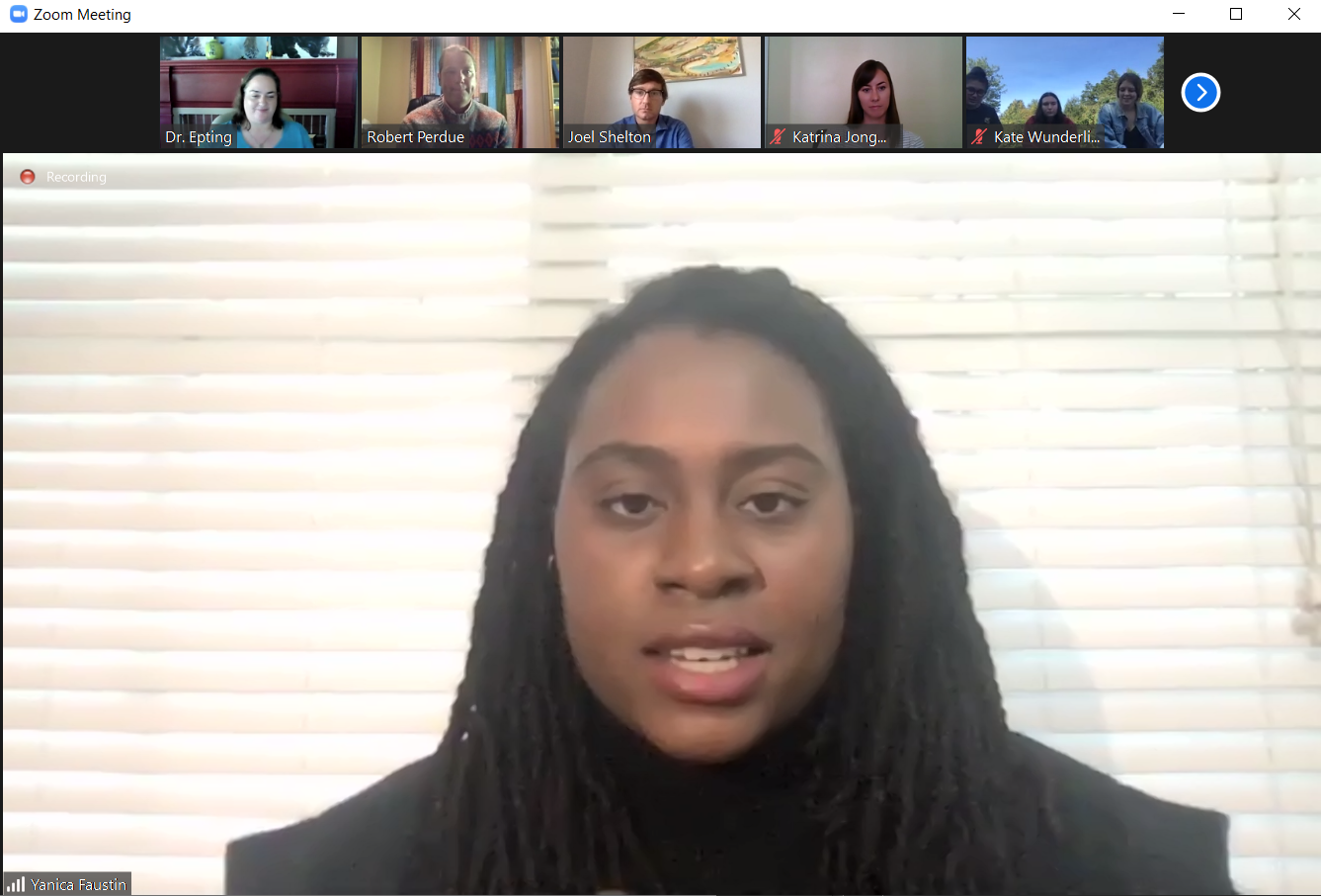This spring, second-year Elon College Fellows will choose a research subject and partner with faculty mentors for their two-year research projects.
A recent series of panel discussions with faculty and upperclassmen from various academic disciplines offered guidance to sophomore Elon College Fellows as they begin their two-year research project.
Earlier in October, a social sciences faculty panel answered student questions around choosing a research topic and finding a mentor. Recently, a group of junior and senior fellows majoring in the arts and humanities stressed to sophomores the importance of time management and flexibility in the research process.
The goal of each was to encourage students to explore their interests, venture into new academic territory, and learn about the research process from experts and other students, said Kim Epting, professor of psychology, Elon College Fellows director, and director of the fellows’ social sciences branch. Similar panels are common experiences in the program as students break ground on their first in-depth research.
Completed during the senior year, the research projects are the culmination of the rigorous and mentored academic exploration inherent to the Elon College Fellows program. Sophomores in the program choose a research topic and mentor, spend their junior year engaged in research, and in their senior year refining their project, which can include performances, presentations and prototypes along with papers. The Elon College Fellows program celebrates the breadth, depth and connections within the arts and sciences. Fellows receive annual scholarships, a travel grant to study abroad, and research funding while enmeshed in a strong community of friends and inquisitive learners.
“Sometimes people try too hard to have research project designed up front,” said Chris Leupold, professor of psychology, during the faculty panel. “What I tell students is to have a general idea, to cast a wide net, and to begin reading. The more you read and expose yourself to different things, you might see missing pieces or see a different way to do that research. That’s where most of my research ideas come from.”
Also participating on that panel were Yanica Faustin, assistant professor of public health studies, Katrina Jongman-Sereno, assistant professor of psychology, Robert Perdue, assistant professor of sociology, and Joel Shelton, assistant professor of political science and policy studies.
The process of interviewing faculty to find a mentor is always daunting for sophomores, so much of the conversation focused on finding the right fit. Professors are looking for mentees who are hard workers and enthusiastic about their topic. Communication and mutual understanding are also key, they said.
“We want the relationship to be mutually affirming,” Shelton said. “We’re learning from each other in this process. And it’s not about affection for a student. Don’t take it’s personally if a professor says ‘no’. They’re looking out for you, and they may know someone else on faculty who can help you more.”
The fellows’ Arts and Humanities director, Professor of English Megan Isaac, said similar panels are held each year to allay students’ concerns over and build community around research.
“Sophomores are always anxious about choosing a topic and feeling locked into a commitment they’re not ready for,” Isaac said. “I hope that these juniors and seniors help them realize that their junior year is a year of discovery and adaptation, and that changing your research and narrowing your focus is part of the process. It’s not a mistake.”
In the arts and humanities panel, juniors and seniors discussed the importance of creating deadlines for various aspects of their projects. Regular communication with their mentors is part of their weekly schedules, several said. But they also learned to give themselves flexibility around class loads, pandemic delays, and life getting in the way.
“Be honest with yourself about what you have and what you need,” said Katie Fulks ’22, who’s choreographing a dance performance as part of her research project. “Trust your instincts to what’s most beneficial to furthering your research and projects. You can do research forever, but at some point you have to stop.”
In branch director Shannon Duvall’s sophomore fellows seminar for math, natural and computational science majors, teams of students are assigned a semester-long, mini-research project to acquaint themselves with the process. They’re evaluated on the process, not the outcomes.
“My philosophy is to give them a start-to-finish, small-scale research opportunity,” Associate Professor of Computer Sciences said Duvall, an associate professor of computer science. “It’s a chance to learn by doing. Then when they start their research project, they have had some experience and hopefully it doesn’t feel so scary. It’s also real-world, and a chance to add to their already impressive resumes.”
Like everything else, COVID-19 has impacted ongoing research projects, they said. Travel is restricted or greatly limited. Metropolitan libraries, museums and other public resources are closed. Refining their methodologies or shifting their approaches has and will remain key. DeLayne Jolly ’21 especially has had to adapt her research into the relevance of community historical museums to new and diverse audiences. She described research as a fluid process of learning by doing.
“Don’t be afraid to keep asking questions,” Jolly said. “We’re all figuring it out as we go along.”



